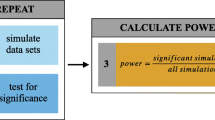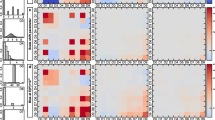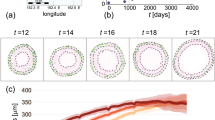Abstract
This paper considers estimation of the parameters for the fractionally integrated class of processes known as ARFIMA. We consider the small sample properties of a conditional sum-of-squares estimator that is asymptotically equivalent to MLE. This estimator has the advantage of being relatively simple and can estimate all the parameters, including the mean, simultaneously. The simulation evidence we present indicates that estimation of the mean can make a considerable difference to the small sample bias and MSE of the other parameter estimates.
Similar content being viewed by others
References
Agiakloglou, Newbold P, Wohar M (1992) Bias in an estimator of the fractional differencing parameter. Journal of Time Series Analysis, forthcoming
Baillie RT, Chung CF, Tieslau MA (1992) The long memory and variability of inflation: A reappraisal of the friedman hypothesis. Michigan State University Working Paper 9102
Box GEP, Jenkins GM (1976) Time series analysis: forecasting and control, second edition, Holden-Day San Francisco
Cheung YW, Diebold FX (1993) On maximum-likelihood estimation of the differencing parameter of fractionally integrated noise with unknown mean. Journal of Econometrics, forthcoming
Diebold FX, Rudebusch GD (1989) Long memory and persistence in aggregate output. Journal of Monetary Economics 24:189–209
Diebold FX, Rudebusch GD (1991) Is consumption too smooth? Long memory and the deaton paradox. The Review of Economics and Statistics 73:1–9
Engel RF (1982) Autoregressive conditional heteroscedasticity with estimates of the variance of United Kingdom inflations. Econometrica 50:987–1008
Fox R, Taqqu MS (1986) Large sample properties of parameter estimates for strongly dependent stationary gaussian time series. Annals of Statistics 14:517–532
Geweke J, Porter-Hudak S (1983) The estimation and application of long memory time series models. Journal of Time Series Analysis 4:221–238
Granger CWJ (1980) Long memory relationships and the aggregation of dynamic models. Journal of Econometrics 14:227–238
Granger CWJ (1981) Some properties of time series data and their use in econometric model specification. Journal of Econometrics 16:121–130
Granger CWJ, Joyeux R (1980) An introduction to long memory time series models and fractional differencing. Journal of Time Series Analysis 1:15–39
Hosking JRM (1981) Fractional differencing. Biometrika 68:165–176
Hosking JRM (1984). Modeling persistence in hydrological time series using fractional differencing. Water Resources Research 20:1898–1908
Li WK, McLeod AI (1986) Fractional time series modeling. Biometrika 73:217–221
Newbold P (1974) The exact likelihood function for a mixed autoregressive-moving average process. Biometrika 61:423–426
Phillips PCB (1987) Time series regression with a unit root. Econometrica 55:277–301
Pierce DA (1971) Least squares estimation in the regression model with autoregressive-moving average errors. Biometrika 58:299–312
Samarov A, Taqqu MS (1988) On the efficiency of the sample mean in long-memory noise. Journal of Time Series Analysis 9:191–200
Shea GS (1989) Ex-post rational price approximations and the empirical reliability of the presentvalue relation. Journal of Applied Econometrics 4:139–159
Shea GS (1991) Uncertainty and implied variance bounds in long-memory models of the interest rate term structure. Empirical Economics 16:287–312
Sowell FB (1992a) Maximum likelihood estimation of stationary univariate fractionally integrated time series models. Journal of Econometrics 53:165–188
Sowell FB (1992b) Modelling long-run behavior with the fractional ARIMA model. Journal of Monetary Economics 29:277–302
Taqqu MS (1975) Weak convergence to fractional brownian motion and to the Rosenblatt process. Zeitschrift Wahrscheinlichkeitstheorie verw. Gebiete 31:287–302
Yajima Y (1988) On estimation of A regression model with long-memory stationary errors. Annals of Statistics 16:791–807
Author information
Authors and Affiliations
Additional information
We gratefully acknowledge helpful comments from the editor, Baldev Raj, and three anonymous referees.
Rights and permissions
About this article
Cite this article
Chung, CF., Baillie, R.T. Small sample bias in conditional sum-of-squares estimators of fractionally integrated ARMA models. Empirical Economics 18, 791–806 (1993). https://doi.org/10.1007/BF01205422
Issue Date:
DOI: https://doi.org/10.1007/BF01205422




